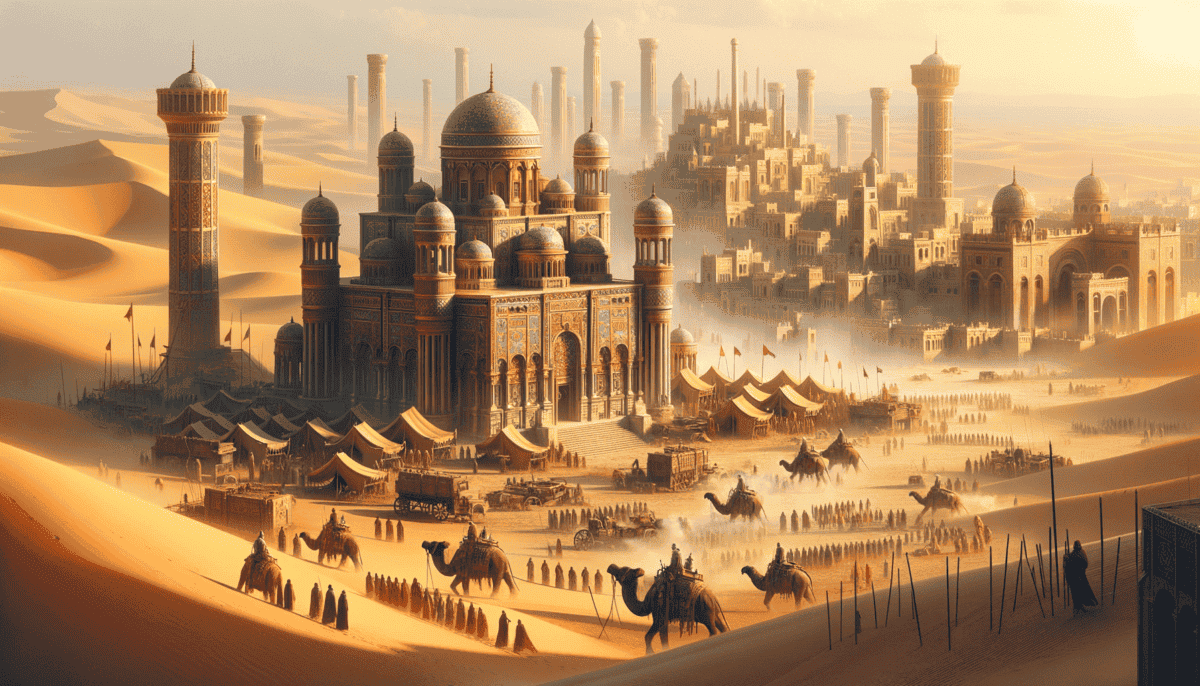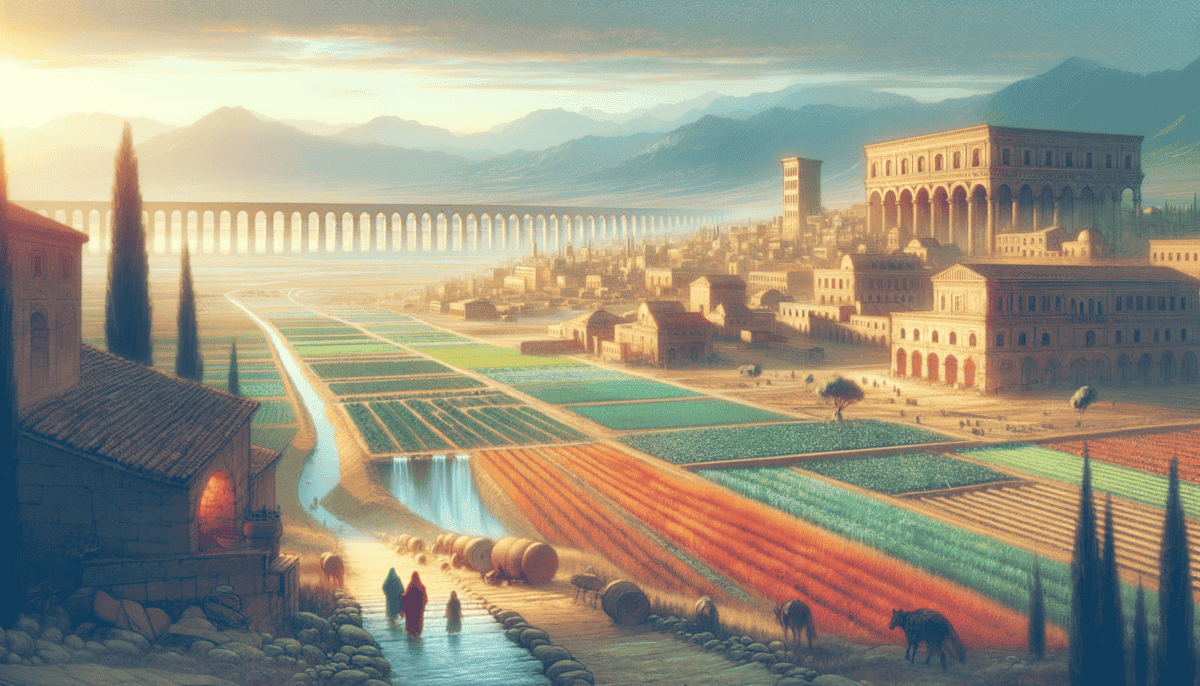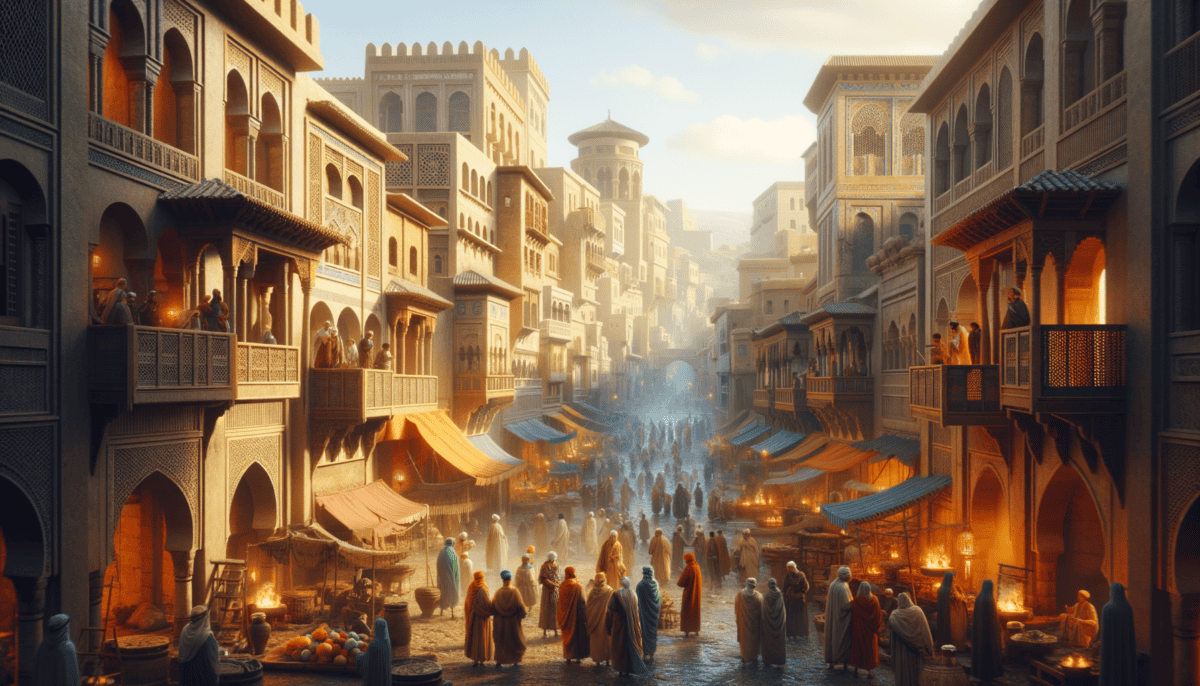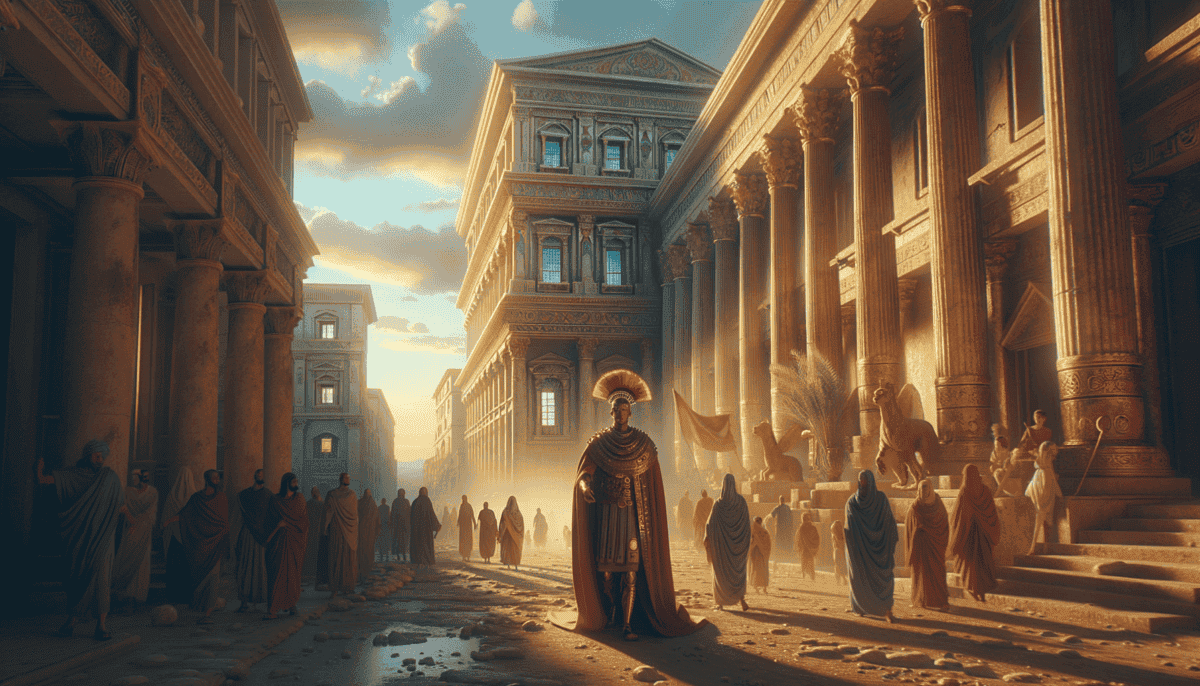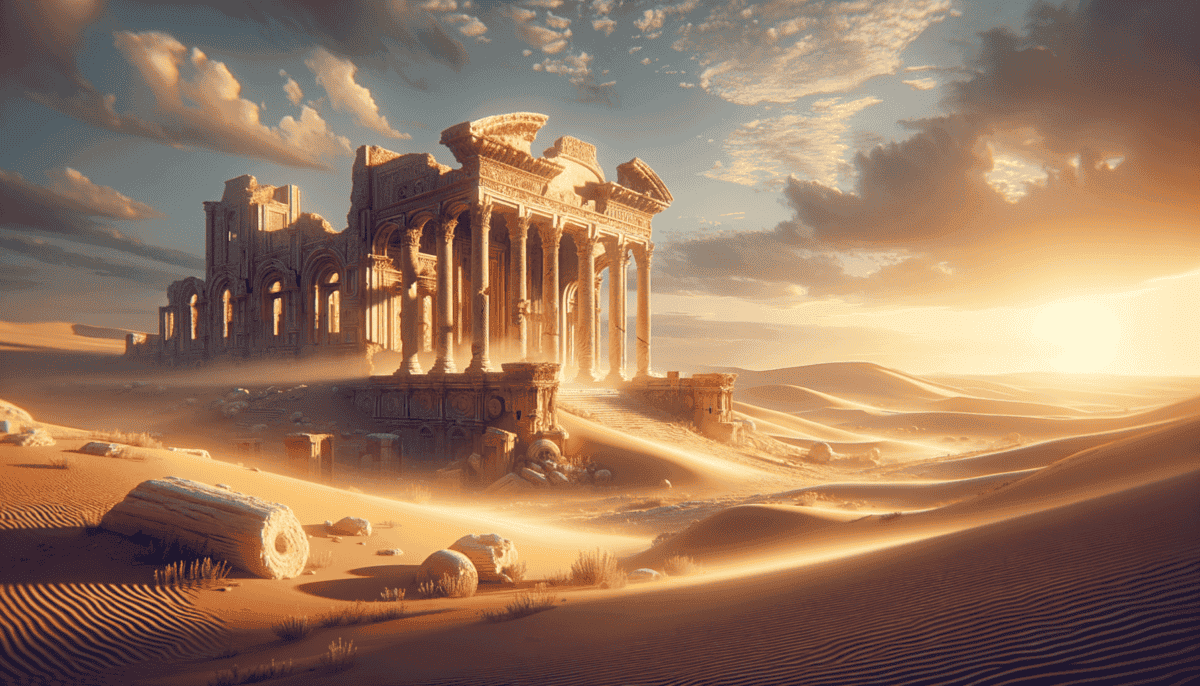The Sands of Change
Marcus stood at the edge of the great desert, his sandals sinking into the warm sand. The young Roman soldier had never seen anything like this before. The golden dunes stretched as far as his eyes could see, like waves frozen in time. ️
"It's so different from Rome," he whispered to his friend Claudius, who stood beside him.
The hot African sun beat down on their armor. In the distance, they could see the mighty walls of Carthage rising up against the blue sky. The city looked like it was made of honey-colored stone, with tall buildings and busy harbors full of ships.
Marcus watched as local Berber traders led their camels along the dusty road. They wore colorful robes that flowed in the wind. Some carried baskets full of dates and olives, while others had beautiful cloth and shiny jewelry to sell.
"Look at their clothes," Claudius said. "They're so different from what we wear in Rome."
A small Berber boy waved at them, his bright smile showing no fear of the Roman soldiers. Marcus waved back, feeling a warmth in his heart that had nothing to do with the desert heat.
New Friends and Old Ways
Later that day, Marcus met Adisa, a Berber merchant who spoke a little Latin. They sat in the shade of a palm tree, sharing sweet dates and stories.
"My people have lived in these lands since the time of our ancestors," Adisa explained, drawing patterns in the sand with his finger. "We know every dune, every oasis, every hidden path through the desert."
Marcus leaned forward, fascinated. "But aren't you worried about Rome coming here?"
Adisa smiled wisely. "The desert is like a great mother – she has room for all her children. Perhaps we can learn from each other."
Trouble on the Horizon
But not everyone felt the same way. In the evening, Marcus heard angry voices from the city. Some people in Carthage didn't want the Romans there. They remembered the old stories of how great their city used to be, before Rome became powerful.
"Something's going to happen," Claudius whispered as they stood guard that night. "You can feel it in the air."
Marcus nodded, watching the torches flicker on Carthage's walls. He thought about Adisa's words about learning from each other. Could Romans and Carthaginians find a way to live together? Or would the sands of North Africa soon be filled with the sounds of war?
The moon rose over the desert, casting silver light on the dunes. In the distance, a lion roared, reminding everyone that this land had its own rules and its own spirit.
• The city of Carthage
• The great desert
• The busy harbors
• The marketplace
• The palm tree oasis
That night, as Marcus lay under the stars, he wondered what changes tomorrow would bring. The desert wind whispered secrets of the past and promises of the future, as two great civilizations stood on the edge of history.
The Desert’s Thunder
The morning sun had barely touched the dunes when Marcus heard the war drums. They echoed across the desert like rolling thunder. Roman legions were marching toward Carthage, their armor gleaming in the early light.
“It’s starting,” Claudius whispered, his hand tight on his sword. “The conquest of North Africa.”
Warriors of the Sand
From his post on the hill, Marcus watched as Berber horsemen appeared like magic from behind the dunes. They rode without saddles, moving as one with their horses. Their leader, a tall man named Massinissa, had joined the Roman side.
“The desert itself fights with us,” Massinissa told the Roman general. “We know its moods, its secrets, its hiding places.”
Fighting in the Heat
Fighting in the desert was nothing like what Marcus had learned back home. The sun was their biggest enemy. It made their armor hot as fire. The sand got everywhere – in their food, their water, their eyes.
“How do you bear this heat?” Marcus asked his friend Adisa, who had stayed to help the Romans.
Adisa laughed. “The desert teaches patience. Like a wise parent, it shows us how to live with it, not against it.”
• Travel at night when it’s cooler
• Know where to find water
• Stay in the shade during hot afternoons
• Wear loose clothes that cover your skin
• Always carry extra water
The Battle Begins
When the armies finally clashed, it was like nothing Marcus had ever seen. Carthaginian war elephants charged through the Roman lines, their feet shaking the earth. The Berber cavalry swooped in and out like desert winds, their spears flashing in the sun.
“Watch and learn,” Massinissa called out. “This is how we fight in Africa!”
The battle lasted all day. Dust clouds rose so high they blocked the sun. The sound of clashing swords mixed with the cries of men and horses.
A New Understanding
As the fighting died down, Marcus found himself sitting with a group of Berber warriors. They shared water and dates, talking in a mix of Latin and Berber words. Despite being on different sides yesterday, today they were just tired soldiers sharing a meal.
“See?” Adisa said, appearing beside Marcus. “The desert has room for all of us. Even in war, we can learn from each other.”
Looking around at the faces lit by campfire, Marcus understood something important. The conquest of North Africa wouldn’t just change this land – it would change Rome too. Every Roman who fought here would take home stories of the desert’s wisdom and the Berber’s bravery.
As night fell, the stars came out, bright and clear in the desert sky. ⭐ The war drums had gone quiet, but Marcus knew this was just the beginning. Tomorrow would bring new battles, new challenges, and new chances to bridge the gap between two very different worlds.
In his tent that night, Marcus wrote in his journal: “The desert teaches us that strength isn’t just about winning battles. Sometimes it’s about learning to bend like a palm tree in the wind, about finding friends in unexpected places.”
Cities in the Sand
The sun rose over a changed landscape. Where once there were only dunes, now stone walls reached toward the sky. Marcus stood at the edge of the new city, watching workers lay gleaming marble blocks. ️
A Dream Made Real
“Look at what we’re building!” young Julia exclaimed, her eyes wide with wonder. She was the architect’s daughter, always excited to show visitors around the growing city of Leptis Magna.
“It’s like magic,” Marcus agreed. “But instead of spells, we use Roman concrete and local stone.”
Working Together
Berber workers and Roman engineers worked side by side. They were building something new – a city that belonged to both peoples.
“See how they mix the local stone with our Roman designs?” Julia pointed to the beautiful columns. “The buildings tell both our stories.”
Adisa, now helping to plan the city’s water system, nodded wisely. “And look at our clever water tricks! We’re teaching the Romans how to find and move water in the desert.”
• Big stone walls to keep out sand
• Cool underground water pipes
• Beautiful public baths
• Huge marketplace
• Theater for plays and shows
Growing Food in the Desert
Outside the city walls, something even more amazing was happening. Green fields spread across what used to be dry earth.
“How did you make the desert bloom?” Marcus asked Adisa.
“We combined your Roman aqueducts with our desert farming wisdom,” Adisa explained. “Now we can grow enough food to feed everyone!”
Farmers used clever tricks to save water. They planted olive trees and grape vines that could survive with little rain. They built walls to catch the morning dew.
A Busy New World
The marketplace buzzed with activity. Roman traders sold purple cloth and shiny glass. Berber merchants offered dates, oils, and beautiful carpets. Ships came from across the sea, bringing new things to trade.
“My father says this will be the greatest city in all of Africa,” Julia said proudly.
“It already is,” Adisa replied with a smile. “Because it belongs to all of us.”
Night in the New City
As evening fell, lanterns lit up the marble streets. In the public square, Roman and Berber children played together, their laughter echoing off the new buildings.
Marcus watched them from his balcony. “We didn’t just build a city,” he thought. “We built a bridge between two worlds.”
Below him, Julia was teaching her friends a Roman game, while they taught her Berber songs. The desert wind carried their happy voices across the city, a sweet music that seemed to say, “This is just the beginning.”
Two Worlds, One Home
The morning market buzzed with life. Lucia, a young Roman girl, walked between the colorful stalls with her new friend Amira, a Berber girl her age. Their sandals clicked on the stone streets of Leptis Magna.
A Special Friendship
“Try this!” Amira held out a sweet date. “My mother got them fresh from our garden.”
Lucia took a bite and smiled. “Yummy! We never had food like this in Rome.”
School Days
At the new school, Roman and Berber children sat together on stone benches. Teacher Claudius wrote both Latin and Berber words on his tablet.
“Today we learn about both our stories,” he said with a smile. “Who wants to share first?”
Amira raised her hand. “My grandmother knows stories about the desert stars!”
• Reading and writing
• Stories from both cultures
• Math for trading
• Songs and games
• Farm and craft skills
Special Celebrations
The city square filled with people. It was time for the harvest festival!
“Look at the dancers!” Lucia pointed excitedly. Roman musicians played while Berber dancers twirled in bright clothes.
The air smelled like sweet cakes and roasted meat. Everyone brought food to share. Roman bread sat next to Berber couscous. Children played games from both cultures.
New Ways to Pray
Amira took Lucia to see the new temple. It was beautiful, with both Roman and Berber designs on the walls. ️
“We pray here together now,” Amira explained. “See the pictures? They tell both our stories.”
People came to honor both Roman gods and Berber spirits. No one had to choose – they could respect both ways.
Family Time
At dinner, Lucia sat with Amira’s family on soft cushions. They ate from clay bowls painted with pretty patterns.
“Tell us about Rome,” Amira’s mother asked kindly.
Lucia shared stories about her old home while trying new spicy foods. The whole family listened and laughed together.
Dreams Under Desert Stars
That night, the girls lay on Amira’s roof, watching the stars. The desert air was cool and sweet.
“I used to miss Rome so much,” Lucia whispered. “But now this feels like home too.”
Amira squeezed her friend’s hand. “That’s because it is your home. It’s our home together.”
Below them, the city slept peacefully. Roman roof tiles mixed with Berber patterns. The night wind carried the smell of desert flowers and sea salt. In their dreams, both girls saw a future where their two worlds were one.
The African Emperor
The sun rose over Leptis Magna as a young boy named Septimius ran through the streets. His heart beat fast with excitement. Today was special – his father would take him to see the governor’s palace!
Big Dreams
“Papa, will I ever live in a palace?” Septimius asked, looking up at the tall white building.
His father smiled. “With hard work, my son, anything is possible. Even a boy from Africa can dream big.”
Learning to Lead
Years passed. Young Septimius studied hard. He learned Latin and Greek. He read about laws and battles. His teachers saw something special in him.
“You have the mind of a leader,” his favorite teacher said. “Rome needs people like you.”
Septimius thought about his home city. He wanted to make it even better. He dreamed of building new roads and beautiful buildings.
The Big Journey
When Septimius grew up, he sailed to Rome. The sea was big and blue. The ship rocked under the hot sun.
“Will they accept someone from Africa?” he wondered.
But Septimius was smart and brave. He worked hard and made many friends. Soon, important people noticed him.
Rising Through Ranks
Each year, Septimius got more important jobs. He led armies and made good choices. People trusted him.
• Study hard
• Make good friends
• Work with honor
• Be fair to everyone
• Remember your home
The Big Day
Finally, something amazing happened. The people chose Septimius to be emperor!
He stood in front of everyone in Rome. His purple emperor clothes shined in the sun. But he didn’t forget his home.
“I am from Africa,” he said proudly. “Now I will help both Rome and Africa grow strong together.”
Making Things Better
As emperor, Septimius built beautiful new buildings in Leptis Magna. He made sure children had good schools. He helped farmers grow more food.
He was fair to everyone – Romans and Africans alike. People said he was one of the best emperors ever!
A Dream Come True
Years later, Emperor Septimius walked through Leptis Magna again. Children ran up to him with big smiles.
“Tell us your story!” they begged.
He looked at their bright faces – Roman and African children playing together.
“Remember,” he said, “your dreams can come true too. It doesn’t matter where you’re from. What matters is who you choose to be.”
Legacy of Two Worlds
The desert winds swept across the ancient stones of Leptis Magna. Time had changed many things, but the city still stood proud against the setting sun.
A City’s Farewell
After Emperor Septimius passed away, his city faced new challenges. The sea began to fill the harbor with sand. Trade became harder. But the people didn’t give up.
Stories in Stone
Marcus, a young stone carver, worked to fix the old buildings. His grandfather told him stories about the great African emperor.
“Look at these walls,” Grandfather said. “They tell our story – both Roman and African.”
Marcus ran his hand over the warm stones. “Will people remember us?” he asked.
“As long as these buildings stand, our story lives on,” Grandfather smiled.
Changes Come Again
New people arrived from far away. They brought different ideas and ways of living. Some things changed, but many stayed the same.
• Strong stone buildings
• Ways of growing food
• Stories and wisdom
• Love of art and learning
• Spirit of working together
Hidden Treasures
The sand covered many old buildings. But like a blanket, it kept them safe. Years later, people found these treasures again.
“Look!” a young girl named Amira called to her friends. “I found an old coin!”
On one side was Emperor Septimius’s face. On the other, beautiful Leptis Magna.
Today’s Children
Now, children like Amira play near the old ruins. They learn about the people who lived here long ago.
“I want to be an archaeologist,” Amira says. “I want to find more stories in the sand.”
Her teacher smiles. “These ruins teach us something important. Different people can work together and make beautiful things.”
A Bridge Through Time
The sun sets on the ancient city. The stones glow orange and pink. Modern cars drive past old Roman roads.
In the evening, families tell stories about brave emperors and clever builders. They remember how Romans and Africans created something special together.
The Story Continues
As stars appear over the desert, new dreams grow in young hearts. Like Septimius long ago, today’s children know they can do great things.
“The past is like a friend,” Amira says, holding her ancient coin. “It helps us build a better tomorrow.”
And so, the story of Roman North Africa lives on – in stones, in stories, and in the hearts of all who call this land home.


